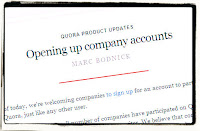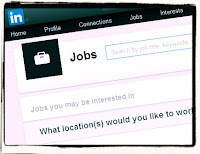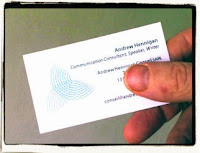Five Reasons Why Your Company Should Have a Quora Account

Since it was founded the social Q&A site Quora has mostly been restricted to individual users. This year a handful of companies were allowed to have company accounts for an experimental period. Now Quora has opened up company accounts to most businesses. According to the Quora announcement, to qualify for a company account "your company must have at least three employees and a mature and built-out website". But why should a company have an account on Quora? Here are five good reasons: Brand Protection . First of all if you don't create an account someone with the same of a similar name might occupy the space. Quora is ranked highly by Google so pages on the site appear quite high in search results. Even if you don't plan to apply much effort to the site it is still prudent to register an account early so that you get the username and URL you want. Market Intelligence . People often wonder what people are thinking about their products and pay market rese...













